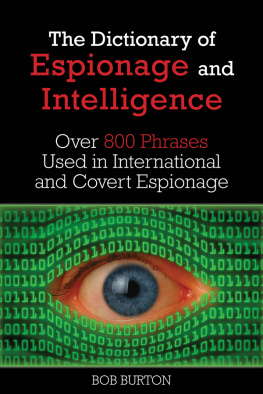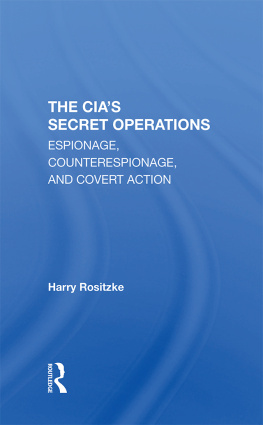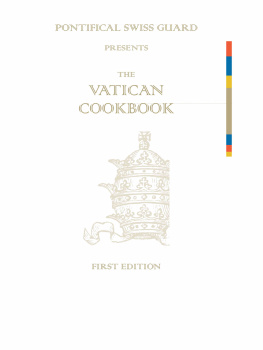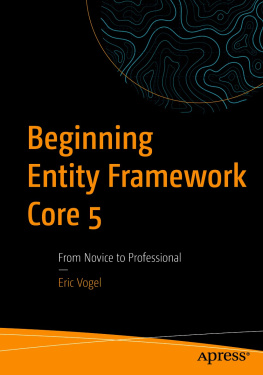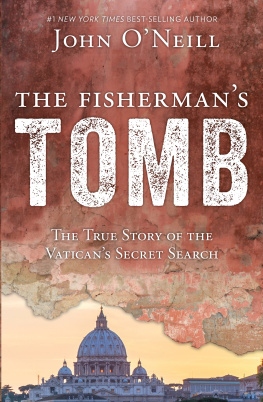Eric Frattini - The Entity: Five Centuries of Secret Vatican Espionage
Here you can read online Eric Frattini - The Entity: Five Centuries of Secret Vatican Espionage full text of the book (entire story) in english for free. Download pdf and epub, get meaning, cover and reviews about this ebook. year: 2008, publisher: St. Martin’s Press, genre: Science fiction. Description of the work, (preface) as well as reviews are available. Best literature library LitArk.com created for fans of good reading and offers a wide selection of genres:
Romance novel
Science fiction
Adventure
Detective
Science
History
Home and family
Prose
Art
Politics
Computer
Non-fiction
Religion
Business
Children
Humor
Choose a favorite category and find really read worthwhile books. Enjoy immersion in the world of imagination, feel the emotions of the characters or learn something new for yourself, make an fascinating discovery.

- Book:The Entity: Five Centuries of Secret Vatican Espionage
- Author:
- Publisher:St. Martin’s Press
- Genre:
- Year:2008
- Rating:4 / 5
- Favourites:Add to favourites
- Your mark:
- 80
- 1
- 2
- 3
- 4
- 5
The Entity: Five Centuries of Secret Vatican Espionage: summary, description and annotation
We offer to read an annotation, description, summary or preface (depends on what the author of the book "The Entity: Five Centuries of Secret Vatican Espionage" wrote himself). If you haven't found the necessary information about the book — write in the comments, we will try to find it.
The Entity: Five Centuries of Secret Vatican Espionage — read online for free the complete book (whole text) full work
Below is the text of the book, divided by pages. System saving the place of the last page read, allows you to conveniently read the book "The Entity: Five Centuries of Secret Vatican Espionage" online for free, without having to search again every time where you left off. Put a bookmark, and you can go to the page where you finished reading at any time.
Font size:
Interval:
Bookmark:
Also by Eric Frattini
SELECTED NONFICTION
Los Espas del Papa
CIA. Joyas de Familia
La Conjura, Matar a Lorenzo de Medici
ONU, historia de la corrupcin
Secretos Vaticanos
Mafia S.A. 100 Aos de Cosa Nostra
Osama bin Laden, la espada de Al
FICTION
El Quinto Mandamiento
THE
ENTITY

FIVE CENTURIES
OF SECRET VATICAN
ESPIONAGE
ERIC FRATTINI
Translated by Dick Cluster
ST. MARTINS PRESS  NEW YORK
NEW YORK
THE ENTITY . Copyright 2004 by Eric Frattini. English translation copyright 2008 by Dick Cluster. All rights reserved. Printed in the United States of America. For information, address St. Martins Press, 175 Fifth Avenue, New York, N.Y. 10010.
www.stmartins.com
Library of Congress Cataloging-in-Publication Data
Frattini, Eric.
The entity: five centuries of secret Vatican espionage / Eric Alonso Frattini; Translated by Dick
Cluster.
p. cm.
ISBN-13: 978-0-312-37594-2
ISBN-10: 0-312-37594-8
1. EspionageVatican CityHistory. 2. Intelligence serviceVatican CityHistory. I. Title.
UB271.V38F73 2008
327.1245634dc22
2008025769
First published in Spain by Espasa Calpe under the title La Santa Alianza
First U.S. Edition: November 2008
10 9 8 7 6 5 4 3 2 1
To Hugo, the most valuable to me
thanks to his constant presence and for the love
that he gives me every day of his life
To Silvia, for her love and her unconditional support in everything I do
To my mother, for always supporting and encouraging me
To the sources who have provided invaluable aid whose names I prefer not to have appear in this book.
To the sources who have provided invaluable aid who have asked that their names not be cited in this book.
To the archivists and librarians of more than thirty-nine institutions in fourteen countries who I have consulted. Without many of the documents to which they gave me access, I could not have written this book.
To Tuhviah Friedman , director of the Institute of Documentation for the Investigation of Nazi War Crimes, in Haifa (Israel), for providing all the documentation about Vatican relations with Nazi Germany, the information about members of the Vatican hierarchys roles in the escape of Nazi war criminals, and the original files on high-ranking Nazis who had contact with Pius XII during the occupation of Italy.
To Alison Weir , for her magnificent documentation on Mary Strewarts reign and her era.
To Dorothee Lottman-Kaeseler , director of Jewish History in Wiesbaden, German Federal Republic.
To David lvarez , professor of politics at St. Marys College, California, for what I have learned from reading his marvelous books. Without doubt, a true maestro.
To Manuel Fernndez lvarez , a true maestro and authentic tower of knowledge on Philip IIs reign and era. I have learned so much from reading his Felipe II y su tiempo (Philip II and His Time) .
To the Office of Information of the Central Intelligence Agency (CIA) in Langley (Virginia); to the administrators of the National Archives and Records Administration (NARA) and the National Security Archives of George Washington University, for giving me access to their documents on the U.S. intervention in Poland under the Reagan administration.
To David M. Cheney , for allowing me to review his magnificent and well-documented historical archives on the Catholic hierarchy and the Roman curia. Without these, I would have found it very difficult to write this book.
To Dick Cluster , for the arduous task of having to translate my book into English, surely not a simple one.
To Phil Revzin , my editor, for believing in this book and in me.
And finally and especially, an acknowledgment to all the people and organizations who erected obstacles, barriers, and stumbling blocks to prevent this book from becoming what it is today. They sharpened my curiosity and, therefore, my research as well.
To all the above, my most humble and sincere thanks. Part of this book belongs to all of you.
In every espionage operation there is an above the line and a below the line. Above the line is what you do by the book. Below the line is how you do the job .
John le Carr , A Perfect Spy

T he papacy, the supreme authority at the head of the Catholic Church, is the oldest established institution in the world. It was the only institution to flourish during the Middle Ages, a leading actor in the Renaissance, and a protagonist in the battles of the Reformation, the Counter-Reformation, the French Revolution, the industrial era, and the rise and fall of communism. For centuries, making full use of their famous infallibility, popes brought their centralized power to bear on the social outcomes of unfolding historical events. The historian Thomas Babington Macaulay, in his study of the history of Protestantism, asserted that the popes knew how to place the Church in the center of events, just as they knew how to mitigate its role. He stressed the pontiffs ability to co-opt new social movements that kept arising over the course of centuries, or to adapt the Church to them.
The emperor Napoleon Bonaparte regarded the papacy as one of the best jobs in the world. Adolf Hitler called it one of the most dangerous and most delicate in international politics. Napoleon likened the power of a single pope to that of an army of 200,000 men. Really, throughout history, the papacy has always displayed two faces: that of the worldwide leadership of the Catholic Church and that of one of the planets best political organizations. While the popes were blessing their faithful on the one hand, on the other, they were receiving foreign ambassadors and heads of states and dispatching legates and nuncios on special missions.
This power has led many to see the popes more as the priests of princes than as the vicars of Christ. From the eighth century on, the supreme pontiffs sought primacy and universal jurisdiction for their pronouncements until in 1931, with the creation of Vatican Radio, they gained uninterrupted contact with the world, which made this desire a reality. During the Reformation, Martin Luther attacked the papacy as an unnecessary human evil. The Catholic historian Lord Acton criticized the papacys excessive centralization and, after a trip to Rome, declared that power corrupts, and absolute power corrupts absolutely.
The history of the Holy Alliance (in 1930 renamed The Entity), the Vaticans spy service, cannot be told without telling the history of the popes, nor can the history of the popes be told without telling the history of the Catholic Church. It is clear that without Catholicism there would be no pope, and, as Paul VI wrote in his encyclical Ecclesiam suam , Take away the sovereign Pontiff and the Catholic Church would no longer be catholic. Without the actual power that the popes have possessed, neither the Holy Alliance nor the counterespionage unit Sodalitium Pianum would exist. Both have formed part of the machinery that they have also helped to create: the Holy Alliance since its foundation in 1566 by order of Pope Pius V, and the
Font size:
Interval:
Bookmark:
Similar books «The Entity: Five Centuries of Secret Vatican Espionage»
Look at similar books to The Entity: Five Centuries of Secret Vatican Espionage. We have selected literature similar in name and meaning in the hope of providing readers with more options to find new, interesting, not yet read works.
Discussion, reviews of the book The Entity: Five Centuries of Secret Vatican Espionage and just readers' own opinions. Leave your comments, write what you think about the work, its meaning or the main characters. Specify what exactly you liked and what you didn't like, and why you think so.

